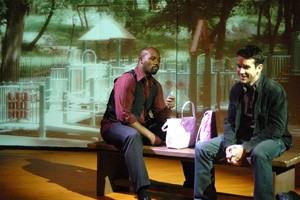
Drift
Hot Summer Nights at the Kennedy
Through Sept. 27
A concept album is one thing; a musical theater work is another. Composer Jeremy Schonfeld’s courageous stage work, Drift, is currently caught somewhere between the two. The Sept. 12 “world premiere” at Barton College in Wilson, before its opening this week in Raleigh, came eight years after the original CD was releasedand three years after a 2006 world premiere at the New York Musical Theatre Festival.
So Drift‘s a work in developmentwhich fits the strengths of the score and production I witnessed in Wilson. What’s already here is likely to impress Raleigh audiences when it opens here this week. Still, with that said, it’s clear that further development lies ahead.
At first read, Drift‘s premisea decidedly noncomic musical about a divorce, told largely from the husband’s point of viewseems either the perfect setup for an SNL sketch or a joyless trial in the kangaroo court of the emotions. But Schonfeld’s sensitive song cycle rises above such pitfalls. Central character David is taking stock, literally and metaphorically, packing up the last few items as he leaves his marriage and the house he’d shared with wife Laura and their unnamed daughter. Later on, the title track poses the work’s central question: “When love has drifted on / What do you rely upon?”
The search takes David different places. Awkward men’s group therapy is immortalized in the witty, poppy comic relief of the song “Cornerstone.” When the guys break for drinks later at a local dive, supporting characters reveal their rougher edges before the haunting “Ghost of a Chance” reveals their most tender hopes. Sharp-eyed self-critique keeps most of the self-pity in check, but when David never really indulges in recriminations against Laura, we wonder if he’s a bit too sympathetic. Given the sharpness of focus elsewhere, the absence of details about what caused David and Laura’s divorce is telling.
Christian Campbell’s vocal work conveys the intimacy of David’s painthough the sound mix disadvantaged him and Yolanda Rabun when we saw it. With Schonfeld himself musically directing the eight actors and the five-piece band, group harmonies were strong, sure and emotionally resonant, particularly on songs like “The Good Wife” and “Ghost of a Chance.”
Chris Bernier’s white set pieces became the canvases for Vincent Marini’s atmospheric projected montages that effectively placed the various scenes. Despite a few momentary directing miscalculations, Lauren Kennedy’s staging was efficient; her actors’ characterizations were believable.
But the largest theatrical question with Drift hinges on its strongest suit: the psychological, episodic nature of Schonfeld’s songs. Since his characters use their lyrics to relate something they’ve already realized, the main events in Drift tend to take place in the time between the songs, and not in them. As with the ancient Greeks, the events that shape the work take place off stage.
It’s why the optimism in “Wide Wide World” seems sudden and unearned: We don’t know what change has occurred to prompt it. The epiphanies there and in “Helluva Guy” literally come out of nowhere: The songs are ultimately responses to transitions that don’t take place on stage.
A musical needs more in the way of continuity and present action than a concept album does. Raleigh audiences will hear an expertly produced concert of a song cycle that achingly, amusingly and forcefully articulates a series of steps in the process of separation. But given the power generate by the pieces assembled so far, here’s hoping Drift ultimately finds its missing parts.

